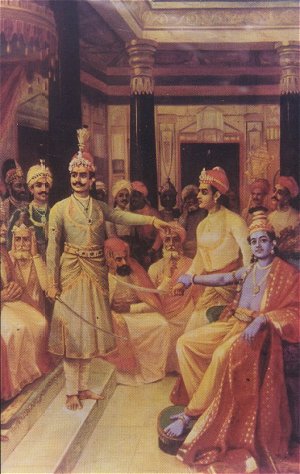The Mahabharata
by Dr. Jyotsna Kamat
First Online: September 03, 2004
Page Last Updated: December 07, 2024
Along with Ramayana, Mahabharata forms the national epic of India. With one hundred thousand verses, 2109 chapters, and eighteen divisions (parvas), it is great (maha) and voluminous (bhara) at the same time! Hence, it is Mahabharata, which reflects Indian ethos in totality. The name also suggests that it is the story of a dynasty of Bharat the first emperor of India. For all Indians it is an epic which deals with the great fratricidal battle between Kauravas and Pandavas. In purely literary meaning, it could be the "great epic of India" that is Bharat.
Over thirty centuries now, Mahabharata is source of inspiration to umpteen number of writers of different Indian languages. Numerous episodes, legends and stories that intersperse, like that of Satyavan-Savitri, Nala-Damayanti, Yayati, Karna, Ekalavya have provided basis theme for independent works.
The great epic is besides a storehouse of ancient knowledge. Philosophy, religion, customs and rituals, polity, science, social life, geography, history, economics, code of conduct, etc., find place in it. That is why some consider Mahabharata as a common man's veda (knowledge). Human interest stories abound, which trait has endeared into young and old alike. For ages, listening to Mahabharata intently formed education in a country where oral instruction was order of the day. It's recitation was also considered as a holy duty and Puranikas or 'Bharatis' (reciters of Mahabharata) got emoluments from the grateful listeners or charitable patrons. Both reciters and listeners thought that good listening to this holy work led to acquiring of punya (merit).
There is difference of opinion about the date of composition of Mahabharata. Numerous Indo-British scholars now agree that the great battle was fought round about 3102 B.C. and the epic might have been written by 1370 B.C. Original work might have been smaller (twenty four thousand verses). Over the centuries many interpolations have crept in. But according to Rajaji, interpolations in a recognized classic seem to correspond to inclusion in the national library in the days when there was no printing. The fact that Harivamsa (Life of Lord Krishna) which forms an appendix and Bhagavadgita, most sacred text of Hindus with twelve thousand and six hundred thirty seven shlokas (verses) form part and parcel of the epic shows its magnitude.
© K. L. Kamat

Last Minute Effort to Avoid War
Painting by Ravi Varma depicts Krishna as ambassador in the court of
Kauravas.
Mahabharat has been a inspiration for great works of Indian art and poetry.
Poets, reciters, play-wrights, Harikatha artists, keertankars, story-tellers, gamakis (singers) and puppeteers kept the tradition of Mahabharata alive through popular media over ages. These provided lessons in religion, entertainment and information at the same time. Children learnt stories from grand parents about Krishna, Arjuna, Bhishma, Bhima and Kouravas. The youth found their ideals in several characters. Women drew inspiration from courageous Draupadi and Kunti. Elders sought relief in the wisdom of Vidura and Bhishma and the latter's sacrifice.
For poets, Mahabharata is a perfect kavya (epic), with depiction of rasas and descriptions. For several it is code of conduct which provides answers to day-to-day problems. It provided guidelines to ruling class, some scholars interpret. But many agree, it symbolizes the eternal conflict between good and evil and inward struggle of man himself. "It strengthens the soul and drives home the vanity of ambition and evil and futility of anger and hatred". This is symbolized by the character of Kouravas.
It provided unfailing and perennial source of spiritual strength over ages.
The message of Mahabharata is victory of dharma (virtue) over evil. But it exposes the harsh truth that winners of war suffer as well. The great war with its endless bloodshed, as also losing nearest kith and kin and eternal loss of peace, made the winning Pandavas unhappy.
Vyasa, the great poet and visionary who wrote Mahabharata had forecast the result in the beginning itself. He tells to his mother Satyavati.
"Happy days were over long back! Coming days are sadder still. Tomorrow will be worse. This Earth has lost its youth."
Ati kranta sukhah kalah
Pratupasthita darunah
Shva Shva Papiya divasah
Prithvi gatayauvvana (Adiparva; 128:6)
This universal message Vyasa uttered, is more relevant than ever in the present context.
![]()

